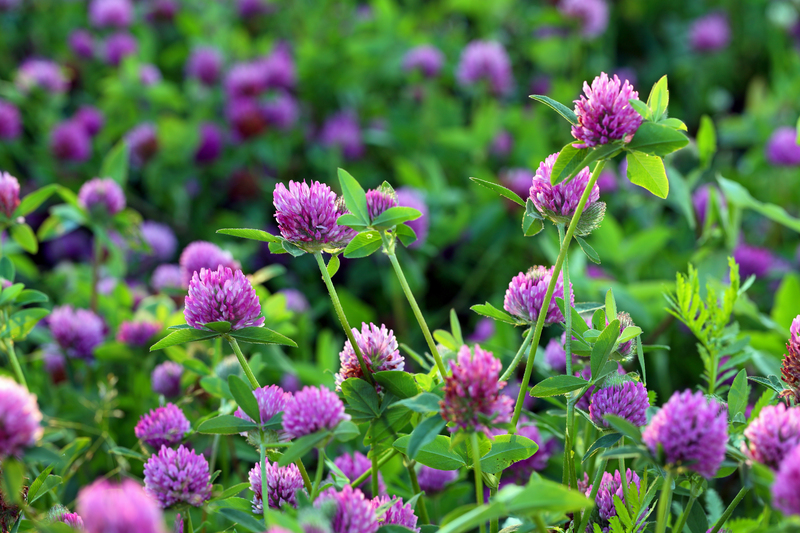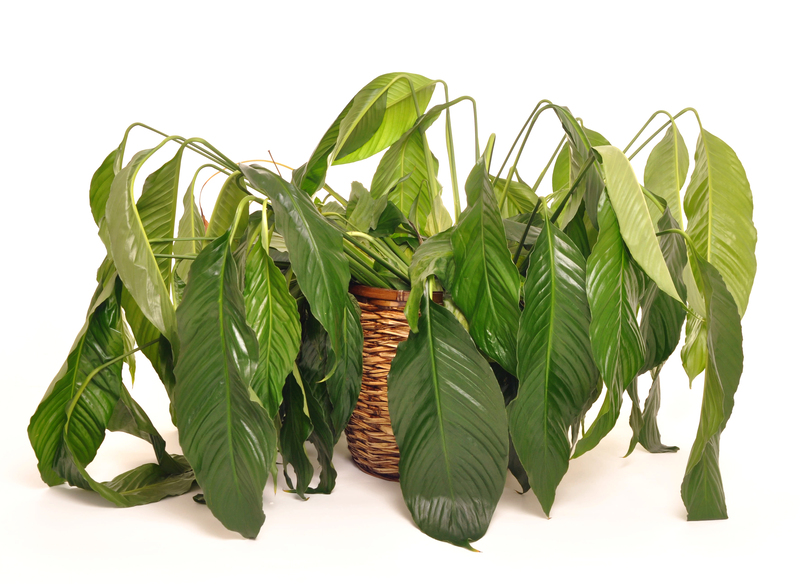Unlocking the Secrets to a Lush Herb Garden
Posted on 27/05/2025
Unlocking the Secrets to a Lush Herb Garden
Welcome to your comprehensive guide to unlocking the secrets to a lush herb garden. Whether you are a seasoned gardener or a beginner looking to add vibrant greenery and fresh flavors to your home, cultivating an abundant and healthy herb garden is within your reach. In this extensive article, you'll discover expert tips, best practices, and insider tricks to ensure your herb garden thrives, providing a continuous supply of aromatic, delicious, and therapeutic herbs.

Why Start an Herb Garden?
Cultivating an herb garden offers a myriad of benefits. Not only does it provide you with fresh, organic ingredients for your kitchen, but it also enhances the beauty of your outdoor or indoor space. Herbs are known for their medicinal properties, aromatic qualities, and ability to attract pollinators like bees and butterflies, adding both value and vitality to your home.
- Healthier Cooking: Fresh herbs impart complex flavors and reduce the need for excessive salt, fats, or artificial seasonings.
- Therapeutic Benefits: Many herbs possess healing properties, aiding digestion, stress reduction, and immune support.
- Eco-Friendly: Growing your own herbs minimizes packaging waste and reduces your carbon footprint.
- Aesthetic Appeal: An herb garden adds lush greenery and fragrance to your surroundings, transforming any space into a green oasis.
Top Secrets to a Lush Herb Garden
1. Choose the Right Location
The foundation of a thriving lush herb garden begins with selecting the ideal location. Herbs generally love sunlight--at least six hours of direct sunlight per day is optimal. However, some herbs like mint and parsley can tolerate partial shade.
- South-facing or west-facing windowsills are excellent for indoor herb gardens.
- For outdoor gardens, pick a spot sheltered from strong winds but exposed to plenty of light.
- Avoid areas where water tends to pool after rain, as excess moisture can cause root rot.
2. Soil Secrets for Herbal Abundance
Soil quality is a critical factor in unlocking the secrets to a lush herb garden. Most herbs favor well-draining, loose, and nutrient-rich soil. Avoid heavy clay soils that retain water or overly sandy soils that dry out quickly.
- Add organic compost to boost soil fertility and texture.
- Use raised beds or containers for better drainage and soil control.
- Test the pH: Aim for a slightly alkaline to neutral pH (6.0-7.5) for most herbs.
3. The Magic of Planning and Planting
A well-planned herb garden not only looks beautiful but also ensures optimal growing conditions for each plant. Consider companion planting to maximize space and deter pests naturally.
- Basil grows well with tomatoes, repelling pests that may harm both plants.
- Rosemary and sage enjoy drier conditions and should be grouped together.
- Mint is invasive; plant it in its own pot or isolated space to prevent spreading.
Spacing is crucial: Allow each herb sufficient room to grow--overcrowding can lead to disease and stunted growth.
4. Watering Wisdom
Unlocking the secret to a vibrant, thriving herb garden means mastering the art of watering. While herbs love moisture, most will suffer if the roots are constantly wet.
- Let the top inch of soil dry out between watering for most herbs.
- Utilize mulch to help retain moisture and regulate soil temperature.
- Water in the morning--this allows leaves to dry before nightfall, reducing fungal diseases.
5. Best Practices for Feeding Your Herbs
Although herbs generally are not heavy feeders, periodic nourishment can dramatically improve your herb garden's lushness.
- Use a balanced, organic fertilizer once a month during the growing season.
- Avoid over-fertilizing, which can reduce essential oil content and flavor.
- Top up with compost tea for a natural nutritional boost.
6. Pruning and Harvesting: Encouraging Abundant Growth
The secret to a truly lush herb garden lies in regular harvesting and pruning. Pruning not only encourages bushier and healthier plants, but also maximizes your harvest.
- Pinch off the tips of stems to promote branching.
- Harvest leafy herbs just before they flower for the best flavor.
- Never harvest more than one-third of a plant at a time to avoid stressing the plant.
Pro Tip: Use sharp, clean scissors or pruning shears to avoid damaging the stems.
7. Pest and Disease Defense
Keeping your herb garden robust means being proactive with pest and disease control. Organic solutions are best, as they protect both your plants and the environment.
- Encourage beneficial insects such as ladybugs to naturally control pests.
- Introduce companion plants like marigolds to repel nematodes and aphids.
- If needed, use mild soap sprays or neem oil to treat infestations.
- Remove infected leaves immediately to prevent spreading.
Top Herbs for a Lush Garden
Basil
Basil thrives in warm, sunny conditions and produces lush foliage when pinched back regularly. Excellent for pest control and culinary uses.
Mint
Mint is vigorous and prefers slightly moist, partial shade. Keep it contained for best results.
Rosemary
This aromatic herb enjoys full sun and well-draining soil. Prune regularly for bushy growth.
Thyme
Low-growing and resilient, thyme loves the sun and requires little water once established.
Parsley
A biennial that flourishes in partial shade or sun, parsley is perfect for container gardens.
Cilantro
Prefers cooler temperatures and quick harvesting--its leaves and seeds are both edible and flavorful.
Sage
Sage thrives in sunny, dry conditions and adds earthy notes to your herb collection.
Secrets to Maintaining a Year-Round Lush Herb Garden
Indoor Herb Gardens
You don't need a sprawling backyard to unlock the secrets to a lush indoor herb garden. Many herbs thrive on sunny windowsills or in small containers under grow lights.
- Choose compact varieties like chives, oregano, and basil for your windowsill garden.
- Ensure adequate drainage and rotate pots for even light exposure.
- Provide a light fertilizing schedule, as indoor plants rely solely on you for nutrients.
Overwintering Herbs
To maintain your lush herb garden through colder months, bring frost-sensitive herbs indoors. Provide them with bright light, moderate temperatures, and reduced watering.
- Cut back on fertilizing during winter dormancy.
- Monitor closely for pests, as indoor environments can harbor spider mites and aphids.
Propagation Secrets
Extend your garden's bounty by propagating herbs from cuttings, division, or seeds. Frequent propagation ensures a continuous supply and prevents your garden from becoming overgrown.
- Many herbs root easily in water, including basil, mint, and oregano.
- Divide perennials like chives and thyme in early spring.
- Sow annual herb seeds every few weeks for successive harvests.
Common Mistakes to Avoid
- Overcrowding: Plants need space for air circulation and healthy growth.
- Neglecting Soil Health: Depleted soils lead to weak, unhealthy plants.
- Ignoring Light Requirements: Each herb has specific light preferences.
- Over- or Under-Watering: Closely monitor soil moisture for optimal results.
- Poor Harvesting Techniques: Improper pruning slows down growth and reduces yields.
Creative Ideas for Your Lush Herb Garden
- Vertical Herb Walls: Use wall-mounted pockets or stacked planters, perfect for small spaces.
- Herb Spirals: Design a spiral mound that provides microclimates for various herbs.
- Companion Flower and Herb Beds: Mix herbs and pollinator-friendly flowers for biodiversity.
- Decorative Pots and Labels: Add personality and organization to your garden with colorful containers.
Enjoying and Preserving Your Herb Harvest
Fresh Use
Use fresh herbs in teas, salads, marinades, and as garnishes to elevate your daily meals.
Drying and Freezing
Preserve excess herbs by drying (hang bundles in a ventilated, shaded area) or freezing (chop and freeze in ice cube trays with olive oil or water).
Herb-Infused Oils and Vinegars
Infuse your favorite oils and vinegars with fresh herbs for homemade gourmet gifts or culinary treats.

Frequently Asked Questions
Q: What are the easiest herbs for beginners?
Basil, mint, chives, and parsley are particularly beginner-friendly due to their fast growth and forgiving nature.
Q: How often should herbs be fertilized?
Once a month during the active growing season is generally sufficient. Opt for organic, balanced options.
Q: Why are my herbs turning yellow or brown?
Common causes include over-watering, poor soil drainage, or inadequate sunlight. Adjust your care routine as needed.
Q: Can I grow a lush herb garden inside year-round?
Absolutely! With adequate light (natural or artificial), well-draining pots, and regular care, herbs can thrive indoors throughout the year.
Final Thoughts: Cultivating Your Lush Herb Dream
Unlocking the secrets to a lush herb garden is not reserved for experts--it's an achievable dream for anyone with passion and dedication. By understanding key factors like sunlight, soil quality, watering, feeding, regular pruning, and pest management, you can create a verdant sanctuary brimming with flavor, fragrance, and beauty. Embrace these secrets and watch your herb garden flourish, transforming your meals, your home, and your gardening spirit!
Latest Posts
Unlock Your Green Thumb: 9 Fundamental Tips for New Gardeners
Reviving Soil Health with Organic Waste Transformation
Exploring the art of growing plants in pots

